Recently, I wrote an article covering the best email clients you can use on a Linux Desktop, all of the email clients in that list were graphical user interface (GUI) programs, but sometimes, users prefer to deal with email directly from the command-line.
For this reason, there is also a need to highlight some of the best text-based email clients that you can use on your Linux system.
Although command-line email clients do not offer as exceptional features as their GUI counterparts, they do offer to present some great and powerful message-handling components.
In this review, we shall exclusively dive into looking at some of the best command-line email clients for Linux and the list is as follows.
Please note, all these below email clients can be installed using default package managers such as yum, dnf, or apt as per your Linux system distribution.
1. Mutt – Mail User Agent
Mutt is a small, lightweight yet powerful text-based email client for Unix-like operating systems. It is feature-rich and some of its remarkable features include:
- Easy to install
- Color support
- Message threading
- Support for IMAP and POP3 protocols
- Delivery status support
- Supports several mailbox formats such as mbox, MH, Maildir, MMDF
- Support for PGP/MIME (RFC2015)
- Multiple message tagging
- Various components to support mailing listing, including list-reply
- Full control of message headers during composition
- The active development community and many more
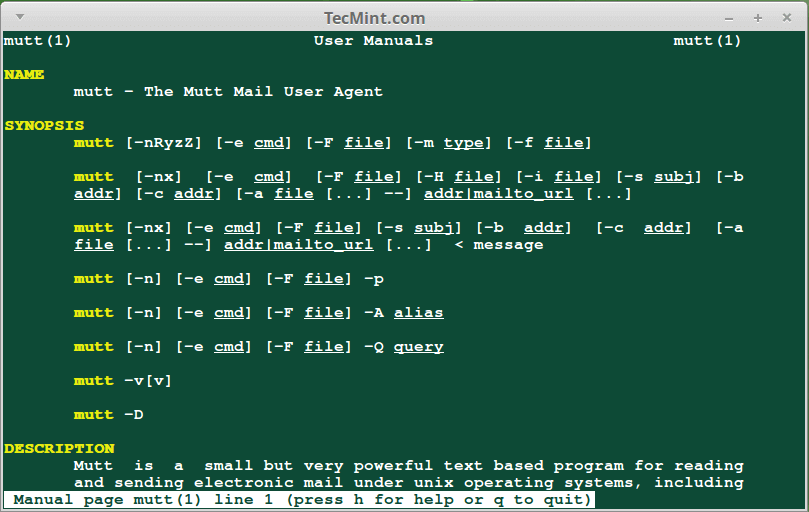
2. Alpine – Internet News and Email
Alpine is a fast, easy-to-use, and open-source terminal-based email client for Unix-like operating systems, based on the Pine messaging system. Alpine also runs on Windows and can be integrated with web-based email user agents.
It works well for new users and experts alike, hence it is user-friendly, and you can simply learn how to use it through context-sensitive help. Additionally, you can easily customize it through the Alpine setup command.
Some of its features include:
- Support for several protocols such as IMAP, POP, SMTP, and so on
- Packaged with Pico text editor
- Supports context-sensitive help on screen
- Well documented
- Not actively developed plus many more
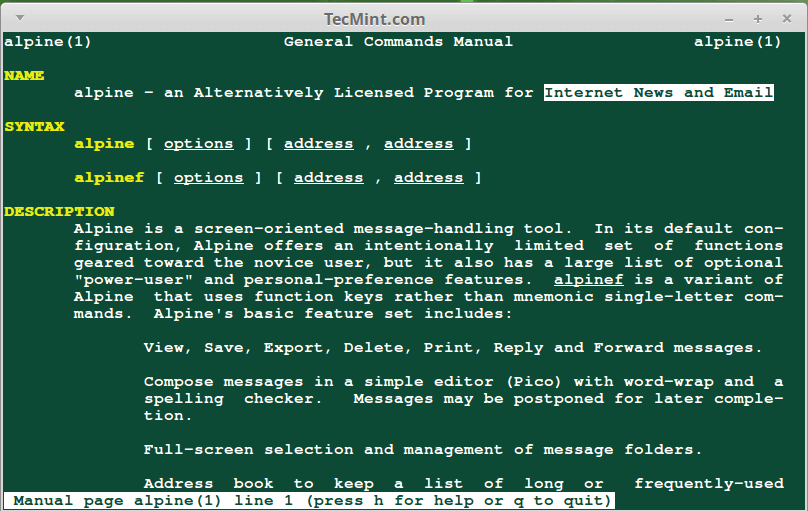
3. Sup
Sup is a console-based email client that enables users to deal with a lot of emails. When you run Sup, it presents a list of threads with multiple tags attached, each thread is a hierarchical assortment of messages.
Sup has some exciting features and these include:
- Can handle so many emails
- Supports fast full-text message search
- Supports automatic contact list management
- Handles emails from several sources including mbox and Maildir
- Easily search through the entire email store
- Supports gpg for privacy functionality
- Supports management of multiple email accounts
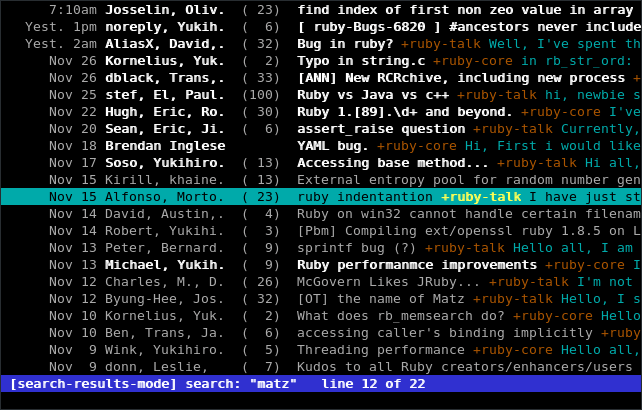
4. Notmuch
Notmuch is a fast, powerful, global-search and tag-based email system that you can use in your Linux text editors or terminal. Its development was highly influenced by Sup, and it offers performance enhancement to several Sup features.
It is not much of an email client, therefore, it does not receive emails or send messages but simply allows users to search quickly through a collection of emails. You can think of it as a library interface to extend an email program for fast, global, and tag-based email searching functionality.
Notmuch has the following notable features:
- Does not support IMAP or POP3 protocols
- No mail composer
- Supports tags and fast search
- No user interface
- Uses Xapian to perform its major task, hence “not much”
- Supports several command-line utilities, email clients, and wrappers for Emacs, vim text editors
- Also supports the Mutt integration script
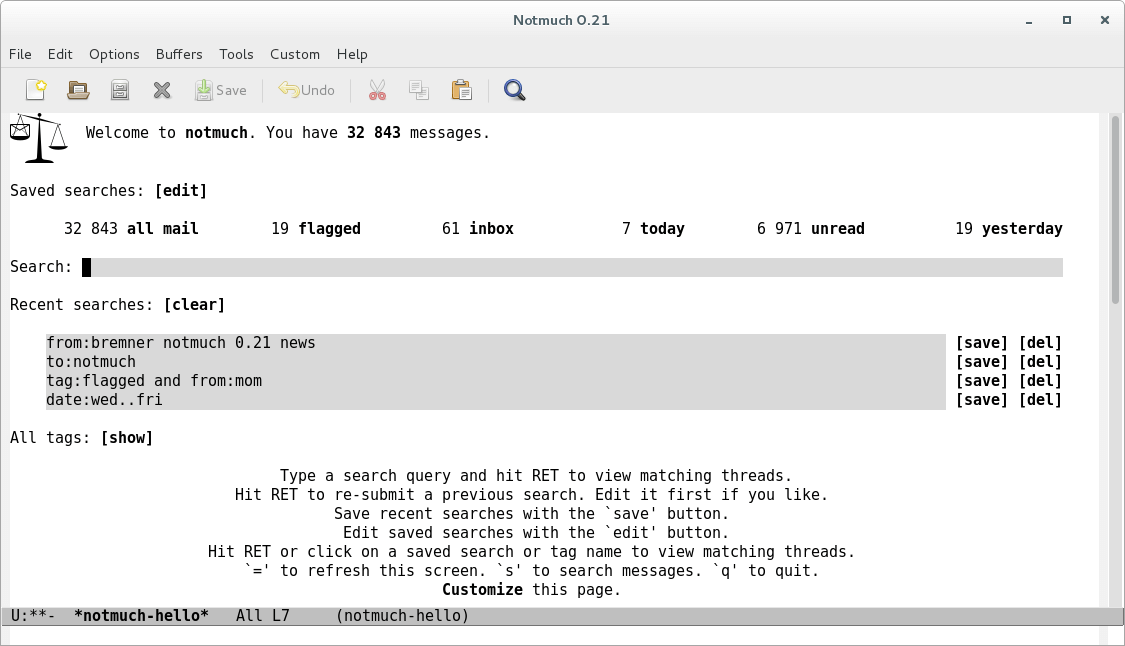
5. Mu4e
Mu4e is an emacs-based email client that allows users to handle e-mails (such as searching, reading, replying, moving, and deleting) very efficiently. The basic idea is to configure an offline Imap client that allows syncing your local computer with a remote email server.
Features:
- Entirely search-based without any folders, only queries.
- Easy documentation with example configurations.
- User interface designed for speed, with fast keystrokes for common actions.
- Support for signing and encryption.
- Address auto-completion as per your existing messages.
- Extensible with available snippets or with your own code.
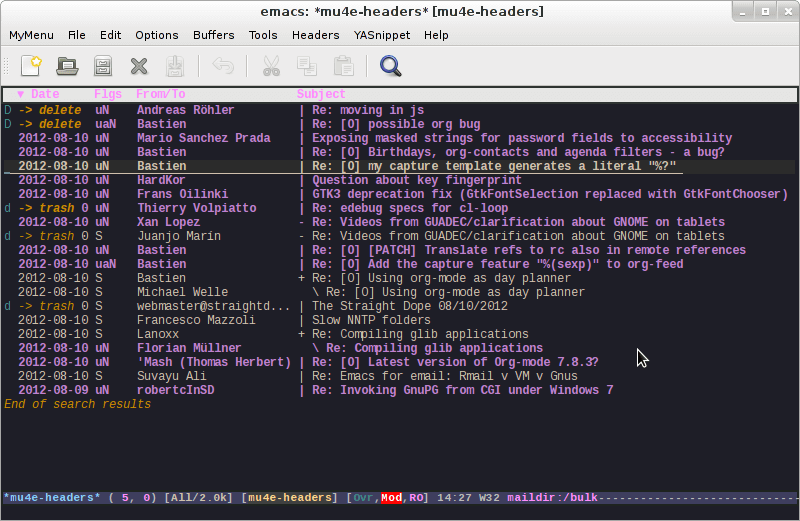
6. Aerc
Aerc is recommended as one of the best email clients that run on your terminal. It is free and open-source software that is very powerful and extensible and is perfect for discerning hackers.
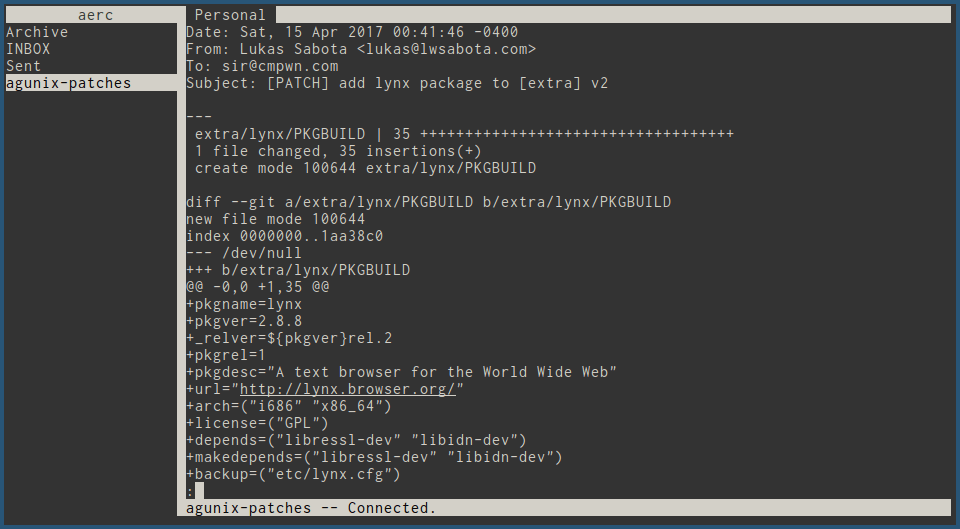
7. NeoMutt
NeoMutt is a tiny, but powerful command-line mail reader program based on Mutt with added features such as color terminals, full-text search, text-based browsers, MIME, OpenPGP, POP and IMAP support, SSL encryption and SASL authentication, and threaded sorting mode.
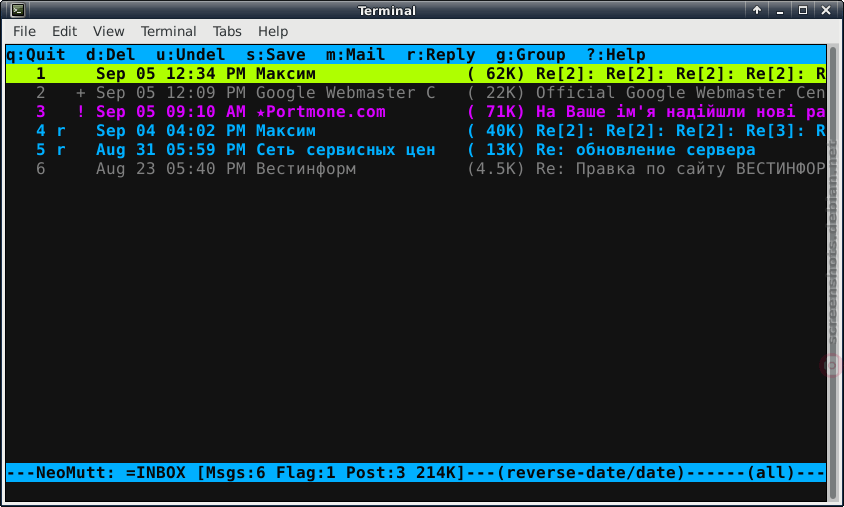
8. Cone – Console Newsreader And Emailer
Cone is another feature-rich text-based mail program and news reader that continuously handles numerous POP3, IMAP accounts, and local mail folders.
It also comes with advanced features for power users such as a built-in text editor for reading/editing emails, html support, address books, SSL/TLS, kview image viewer, and xpdf for displaying pdf files.
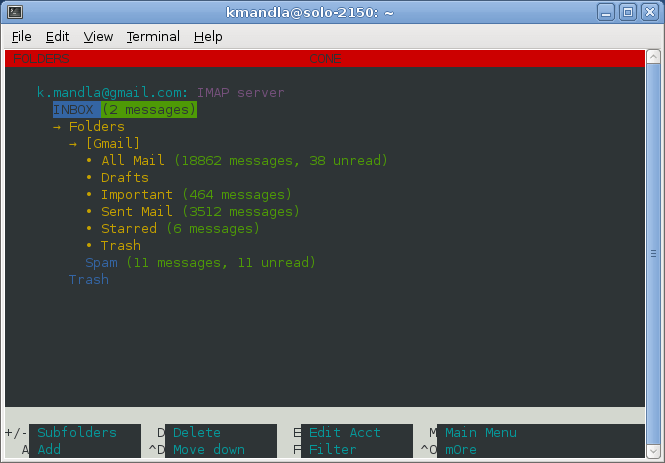
The above-listed command-line or terminal or text-based email clients are the best you can use on your Linux system, but many times, you can only find out the good features and performance attributes of an application after testing it.
Therefore, you can give all of them a try and choose which one to use, that is in case you are a command-line addict, who does not use GUIs so much.
Importantly, you can also let us know of any other command-line email clients that you think deserve to appear in the list above, through the comment section below.





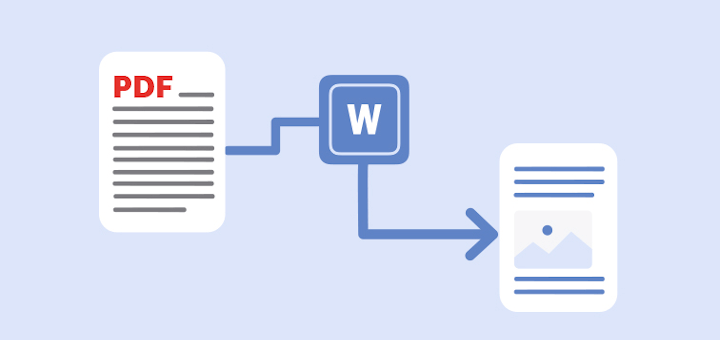
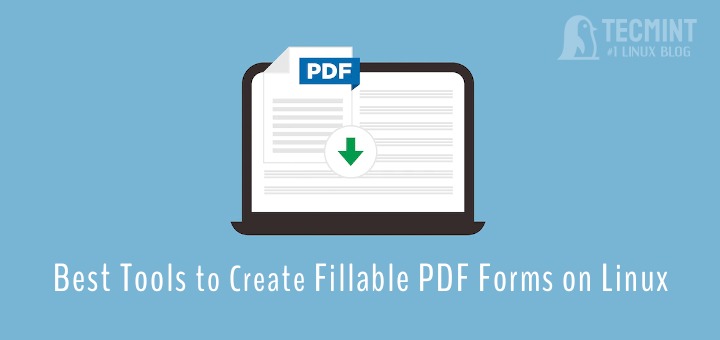
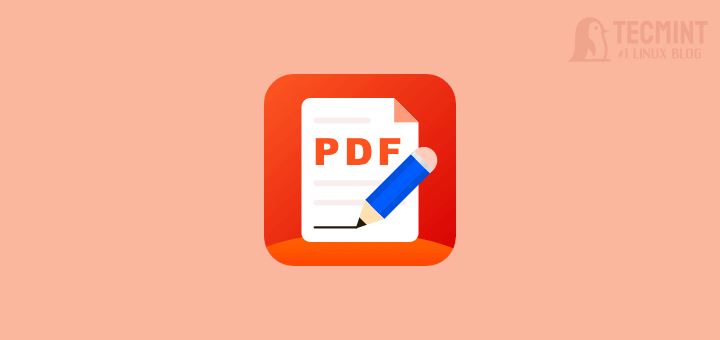
Great list and even greater that it’s still updated!
Would love to see a container/intro listing these clients among their respective footprints and/or bulky dependencies that might already be there or not.
Also, clients providing a cheat sheet with hotkeys for newbies could be highlighted to make this article an eternal must-read.
Stay out of lumail, project abandoned and their original site is not active…
@ed,
Thank you for the update! We’ve taken note of your feedback and have removed lumail from the article.
I have used “nmh” for years since the ’90s, in linux and freebsd (and before in sunos), and it has always worked well. The other one that I use sometimes is “snail” (in debian I believe it is named “s-nail“),
@Jose,
We really didn’t know about these email clients, thanks for informing us. We will test these email clients and include them in the list…
I still prefer a GUI but it is useful to know this is possible.
Thanks for the list. I’ve been using pine/alpine for more than two decades. It has been reliable and easy to use. But now I will have to part with alpine because it effectively died away.
1st symptom: The documentation has been removed from
www.washington.edu.2nd symptom: There is no “official” package in Archlinux.
After considering mutt (and others) I humbly returned to alpine because I could not find an MUA which could handle 10GB of mails in 1000+ Mbox files via IMAP as efficiently as alpine.
For that, I pulled the git archive (alpine 2.24), compiled, and installed it. On a text console, it worked out of the box. To get it working under xfce4 I had to edit two files:
First, /etc/mailcap for opening an html-part with w3m or firefox in a text and GUI environment, respectively. Second, /etc/ssh/ssh_config to allow ForwardX11 and ForwardX11Trusted for localhost.
What about the cone? I use it for years now and it is very simple to set up (even for multiple accounts), supports GPG and even Newsserver…
Privacy is not important for the author ;))
I would also keep in mind how it stores emails.
I prefer to have 1 inbox for all my 10 boxes ;)) ;)) maildir looks to be important in that case ;)) when coming from vacations ;))
Thank you for making this list and sharing it Ravi :)
I am a rookie for Non-GUI Email Clients. Could anyone suggest or recommend 1 or 2 to start with?
Thanks
Actually to be more specific with my question: How much better is Mutt than Heirloom Mailx? And Mu4e looks nice, but is it running in Terminal too?
@Drpeppercan,
I suggest you should opt for Mutt or Mu4e…
Thank you Ravi :)
mu4e package for emacs is the best I’ve found. Configured with org-mode it can even be used to send rich text emails from the terminal. It’s a bit of a hard to set up nicely, but once configured it’s perfectly usable as a day to the day email client.
They’re all a PITA to use, especially out of the box. I remember spending hours configuring mutt and still never got it to a point where it worked the way I wanted it to. It always felt like I was working around its issues, esp. with IMAP.
I don’t like the expanding bloat of web mail clients, but there’s little alternative. I just void email nowadays anyway. Maybe one day suckless will feature an email client that can work nicely with modern technology and needs while remaining lean.
would love to see something in one of these clients that supports html in the signature so I can add a logo and style to it.
What about Emacs based email clients like Guns? Also do check the email categorization tool like PopFile.
I never used but Jaro Mail (https://www.dyne.org/software/jaro-mail/) looks promising.
@libreman
Thanks for the feedback, we shall check it out and write a review soon
Nice, it will be nice if they can support MS exchange.
@Tsepo
That would be absolutely nice and helpful. In that case, we do not exactly know as this aspect is not listed in their features or supported mail platforms, but probably they do.